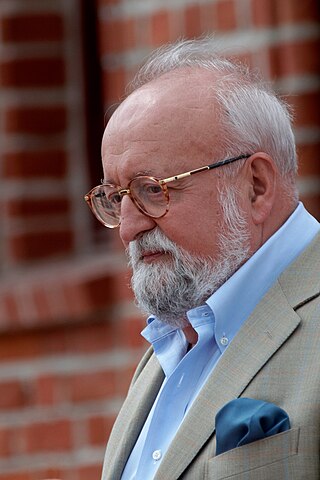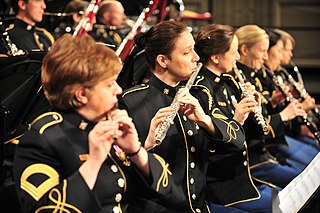Related Research Articles

Boléro is a 1928 work for large orchestra by French composer Maurice Ravel. It is one of Ravel's most famous compositions. It was also one of his last completed works before illness diminished his ability to write music.

Evan Ziporyn is an American composer of post-minimalist music with a cross-cultural orientation, drawing equally from classical music, avant-garde, various world music traditions, and jazz. Ziporyn has composed for a wide range of ensembles, including symphony orchestras, wind ensembles, many types of chamber groups, and solo works, sometimes involving electronics. Balinese gamelan, for which he has composed numerous works, has compositions. He is known for his solo performances on clarinet and bass clarinet; additionally, Ziporyn plays gender wayang and other Balinese instruments, saxophones, piano & keyboards, EWI, and Shona mbira.
In music, instrumentation is the particular combination of musical instruments employed in a composition, and the properties of those instruments individually. Instrumentation is sometimes used as a synonym for orchestration. This juxtaposition of the two terms was first made in 1843 by Hector Berlioz in his Grand traité d'instrumentation et d'orchestration modernes, and various attempts have since been made to differentiate them. Instrumentation is a more general term referring to an orchestrator's, composer's or arranger's selection of instruments in varying combinations, or even a choice made by the performers for a particular performance, as opposed to the narrower sense of orchestration, which is the act of scoring for orchestra a work originally written for a solo instrument or smaller group of instruments.
Christopher Chapman Rouse III was an American composer. Though he wrote for various ensembles, Rouse is primarily known for his orchestral compositions, including a Requiem, a dozen concertos, and six symphonies. His work received numerous accolades, including the Kennedy Center Friedheim Award, the Grammy Award for Best Classical Contemporary Composition, and the Pulitzer Prize for Music. He also served as the composer-in-residence for the New York Philharmonic from 2012 to 2015.
Gary Green is an American conductor, specializing in the wind band.
Symphony in B-flat for Band was written by the German composer Paul Hindemith in 1951. It was premiered on April 5 of that year by the U.S. Army Band "Pershing's Own" with the composer conducting.
Alberto Posadas, is a Spanish composer.

The Symphony No. 3 is a symphony in five movements composed between 1988 and 1995 by Krzysztof Penderecki. It was commissioned and completed for the centenary of the Munich Philharmonic. Its earliest version, Passacaglia and Rondo, premiered at the International Music Festival Week in Lucerne, Switzerland, on August 20, 1988. It was performed by the Lucerne Festival Orchestra and conducted by Penderecki. The full symphony premiered in Munich on 8 December 1995, performed by the Munich Philharmonic, again conducted by the composer.
October is a contemporary piece for concert band approximately six minutes in duration that was written by Eric Whitacre in 2000.

Colonial Song is a musical composition written by Australian composer Percy Grainger. Although Grainger created versions for different types of musical ensembles, its most commonly used version today is for concert band.
The following is a list of musical works which received their premieres at Carnegie Hall:
Rotae Passionis is a piece for mixed chamber ensemble by the American composer Christopher Rouse. It was commissioned by Boston Musica Viva and completed in 1983, when the work was first performed. It is dedicated to Carl Orff, who died the previous year.

The woodwind section, which consists of woodwind instruments, is one of the main sections of an orchestra or concert band. Woodwind sections contain instruments given Hornbostel-Sachs classifications of 421 and 422, but exclude 423
The Concerto for Wind Ensemble is a concerto for wind ensemble in five movements by the American composer Steven Bryant.
The Concerto for Orchestra is an orchestral composition by the American composer Christopher Rouse. The work was commissioned by the Cabrillo Festival of Contemporary Music and is dedicated to conductor and frequent Rouse collaborator Marin Alsop. The piece was completed February 24, 2008 and premiered at the festival August 1, 2008, with Marin Alsop leading the Cabrillo Festival Orchestra.
Odna Zhizn is a symphonic poem by the American composer Christopher Rouse. The work was commissioned by the New York Philharmonic and was completed in 2009. It was first performed on February 10, 2010, at Avery Fisher Hall in New York City, by the New York Philharmonic under the direction of Alan Gilbert.
Raise the Roof is a one-movement concerto for timpani and orchestra by the American composer Michael Daugherty. The work was commissioned by the Detroit Symphony Orchestra for the opening of the Max M. Fisher Music Center. It was premiered in Detroit, October 16, 2003, with conductor Neeme Järvi leading the Detroit Symphony Orchestra and timpanist Brian Jones. Daugherty later arranged the piece for concert band in 2007; this arrangement was commissioned by the University of Michigan Symphony Band and was premiered under conductor Michael Haithcock at the National Conference of the College Band Directors National Association on March 30, 2007. Raise the Roof is one of Daugherty's most-programmed pieces and has been frequently performed as a concert opener since its publication.
Berceuse Infinie is an orchestral composition by the American composer Christopher Rouse. The work was commissioned by the Baltimore Symphony Orchestra and was completed on July 1, 2016. It was first performed by the Baltimore Symphony Orchestra under the direction of Marin Alsop at Joseph Meyerhoff Symphony Hall on November 30, 2017. The piece is dedicated to Marin Alsop.
Ann Cleare is an Irish composer. She is assistant professor at Trinity College Dublin. In 2019 she won the Ernst von Siemens Composers' Prize, sharing it with Annesley Black and Mithatcan Öcal.
References
- 1 2 Rouse, Christopher. Wolf Rounds: Program Note by the Composer. 2007. Retrieved March 6, 2015.
- 1 2 Guy, Kingsley (April 15, 2007). "Frost winds to lift Wolf Rounds". Sun-Sentinel . Tribune Publishing. Archived from the original on April 2, 2015. Retrieved March 6, 2015.